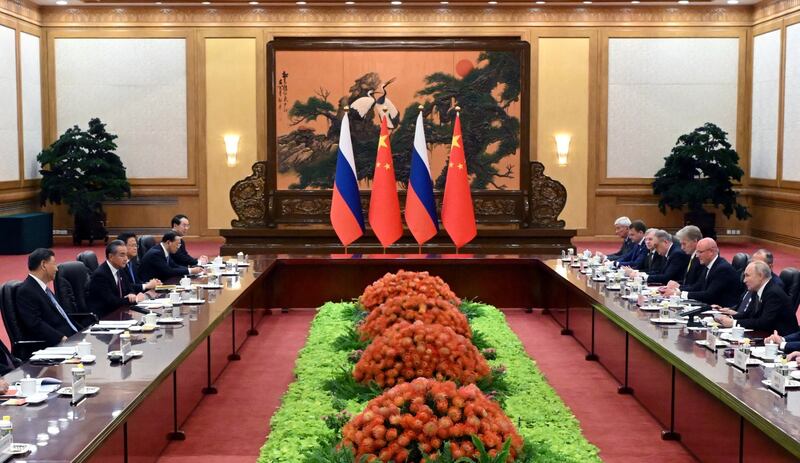Russian President Vladimir Putin touched down in Beijing to a red-carpet welcome by a military honor guard on Tuesday for China’s third Belt and Road Forum, or BRF, which got underway Wednesday.
Speaking to nearly 30 national leaders and more than 100 delegations, directly after Chinese President Xi Jinping on Oct. 18 in Beijing’s palatial Great Hall of the People, Putin said that China and Russia share an “aspiration for equal and mutually beneficial cooperation.”
The event marks the 10th anniversary of China’s Belt and Road Initiative, a worldwide sprawling network of economic deals that some say has turned China into the world’s biggest debt collector, and others argue is bringing hope to the Global South.
The Russian president, who is accused by the International Criminal Court of committing war crimes in Ukraine, spoke of “respecting civilization diversity and the right of every state for their own development model.”
Some observers interpreted the message as push-back against calls for authoritarian leaders to respect human rights and embrace political freedoms, if not democracy.
Xi may not be cut of the same cloth as Mao Zedong but he’s certainly the most assertive leader since Mao – clearly bent on projecting China as an alternative leader to the U.S., and aims to expand China’s global influence with Russia at its side for as long as the deal is convenient.
“This BRF is a big deal I think,” said George Magnus, research associate at the China Centre, Oxford University, and the School of African and Oriental Studies in London.
“It’s the 10th anniversary of Xi’s signature foreign policy statement, and even though the BRI [Belt and Road Initiative] isn’t doing anything like the financing it did in 2014-17, it’s still a key vehicle for Xi, specifically to trade commerce for political favors, and to attract member states to his three Initiatives – development, security and civilization.”
He also noted the role of Putin in this framework cannot be understated.
“Putin is very much in on this moment, and China is clearly pro anything that challenges or drains American power and influence. I imagine they’ve got a lot to talk about.” Magnus added.
Such a view is echoed by Brian Hart, a fellow at the China Power Project, Center for Strategic and International Studies.
“During this meeting, I think Xi and Putin will be discussing how they can continue to support each other going forward, and how they work together to jointly push back against the United States and its allies.”
‘Junior partner’
Xi and Putin spoke to each after the event at the Great Hall of the People, with Xi hailing Putin as “my old friend,” and speaking of the two nation’s “close, effective strategic coordination,” China’s state broadcaster CCTV reported.
The reality, however, is that Putin is now roped to the Chinese agenda and Xi Jinping’s “vision” of a new mode of global governance best described as autocracy.
Putin was singing Xi’s praises even before he boarded the flight to Beijing.
“President Xi Jinping is a different kind of person,” he told Chinese media in Moscow. “He is a firm, calm, pragmatic, and reliable partner … [and] Russia highly appreciates China's proposals to end the Ukraine crisis.”

Zsuzsa Anna Ferenczy, a former political adviser at the European parliament and now with National Dong Hwa University in Taiwan, told RFA that, under Putin, Russia had become both politically and economically dependent on China.
She suggested “in the long-run, [it] might prove to be yet another of Putin’s miscalculations” insofar as it has made Russia the junior partner for China.
“For now, by providing political support to advance a shared goal [for example] to discredit liberal democracy, and by ensuring that Russia has the economic means to sustain the aggression [in Ukraine] despite international sanctions, Xi has skillfully turned himself into an indispensable friend to Putin,” said Ferenczy.
“Ironically, this happened under Xi’s favorite mantra of win-win, mutual respect and equal partnership, which are also core elements of Xi’s alternative governance model.”
Separately, Hart from Center for Strategic and International Studies said there is a clear strategic calculus behind Xi’s moves to court closer ties with Putin.
“Heightened tensions between the U.S. and China has pushed Beijing to seek partners to push back against Washington and its allies. Russia is by far the most powerful country on the world stage willing to cooperate with China on important issues,” Hart added.
“The Sino-Russia relationship is certainly not based on trust and friendship as we would understand, say, alliances. But for all of that,I think the mutual interest to distract or challenge the U.S. and NATO etc is for the time being pretty solid,” Oxford’s Magnus said.
But Ferenczy suggested that the relationship’s frailty resides in the fact that it’s an unequal alliance based on a common fear.
“While Putin’s reliance or dependence on Xi can still mean win-win, theirs is not a partnership of equals, nor is it based on mutual trust,” said Ferenczy. “It is, however, based on a shared fear of liberal democracy, transparency and rule of law, and a common embrace of control ... For now, Xi has the upper hand and they both know it.”
On social media, Andreas Fulda, associate professor at Nottingham University, offers a more foreboding perspective.
"The vision of a 'multipolar world' led by dictators Xi and Putin is the dream of every autocrat (and a worst-case scenario for all those of us who still believe in the value of open societies based on democracy, human rights and the rule of law)," said Fulda, who is also author of "The Struggle for Democracy in Mainland China, Taiwan and Hong Kong," on X, formerly known as Twitter.
Edited by Taejun Kang and Elaine Chan
